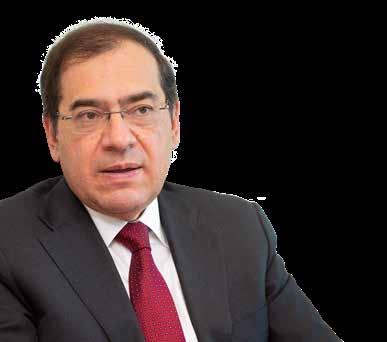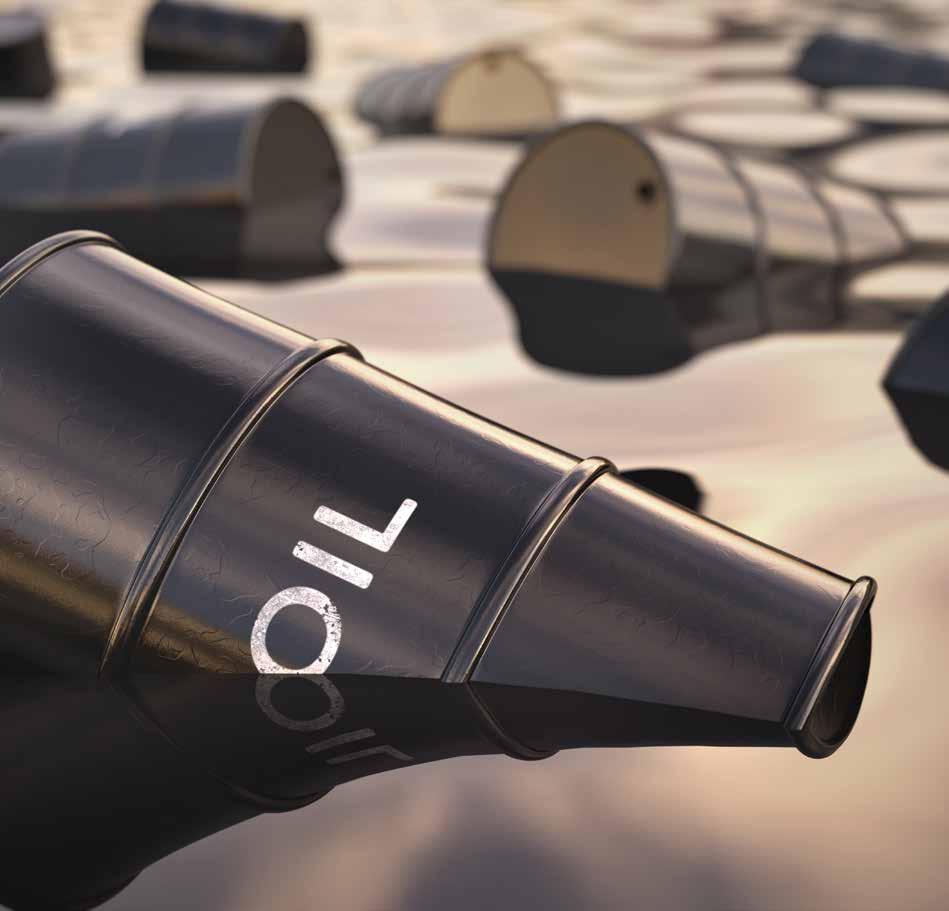
17 minute read
EOG’S ROUNDTABLE EXPLORES EGYPT’S BROWNFIELDS DYNAMICS
BY FATMA AHMED, JASMINE SHAHEEN
Under the patronage and with the participation of H.E. Eng. Tarek El Molla, Minister of Petroleum and Mineral Resources , Egypt Oil & Gas (EOG) Committee hosted a virtual roundtable on October 18, focusing on increasing investments in Egypt’s brownfields. The minister, alongside several prominent figures from international oil companies (IOCs), Abed Ezz El Regal; CEO of Egyptian General Petroleum Corporation (EGPC), and Samir Abady; EGPC’s Deputy CEO for Production, delved into a topical discussion on brownfields optimization in Egypt.
Advertisement
The discussion probed several issues of concern regarding brownfields development. The selected topics included optimum brownfield revival strategies, technology’s role in boosting production from brownfields, as well as the economic barriers of using brownfields. The roundtable created a space for discussing Egypt’s untapped opportunities in brownfields as well as to present strategic and possible recommendations to improve mature fields.
Mohamed Fouad, EOG’s Managing Director, began his opening remarks affirming that the current pandemic urges action to lay down a foundation for growth. He noted that “brownfields count as a fundamental element for the oil and gas sector that also reflects on its economy.” This has been made evident enough that industry leaders and foreign partners in Egypt began expanding their scope of exploring brownfield opportunities. Fouad remarked that the roundtable hopes to “be another enabler to the government’s efforts to increase investments in Egypt’s brownfields.” The minister commenced the virtual event denoting that “Egypt has taken several bold reforms over the past few years on both the government and economic levels as well as the oil and gas sector level." The minister alluded to such steps which have raised the bar for Egypt’s oil and gas sector, leading it to withstand the pandemic’s aftereffect. El Molla asserted that through developing technologies and refining competent skills and human resources, Egypt can go a long way.
When it comes to brownfield enhancement, “Egypt has several opportunities in this area as well as some successes,” the minister continued, requesting that EOG Committee and EGPC form an action plan to attract brownfield investments, improve performance, and increase crude production. That is exactly where the Brownfield of Excellence (BCoE) comes to play.
THE MAIN OBJECTIVES ARE TO ATTRACT INVESTMENTS IN THE BROWNFIELDS AND IMPROVE PERFORMANCE AND INCREASE CRUDE OIL PRODUCTION

H.E. TAREK EL MOLLA
MINISTER OF PETROLEUM & MINERAL RESOURCES - ARAB REPUBLIC OF EGYPT
THE BROWNFIELD CENTER OF EXCELLENCE
On that note, Sameh Sabry, Chairman of the EOG Committee, and Vice President (VP) and Managing Director at Wintershall Dea-Egypt, joined the conversation reflecting on the committee’s progress during the past period. He pointed out that during the slow-down period, there has been a restructure within the committee so that they strengthen its impact and expand its scope. In light of expanding brownfields’ scope of work in Egypt, Sabry mentioned that EGPC is currently exploring brownfield opportunities with each IOC separately. Then he proceeded to present the EOG Committee white paper on brownfields which focused on “identifying a number of strategic solutions and 28 initiatives to help improving brownfields in Egypt,” he stated.
In addition to the white paper, he introduced the BCoE approach, governed by academia in cooperation with EGPC and the EOG Committee. The BCoE aims to “identify measures to increase production, optimize costs, and generally improve the brownfield conditions in Egypt to attract further foreign investments,” he assured. Sabry emphasized EGPC’s catalyst role in establishing the BCoE; connecting the BCoE with EGPC’s subsidiaries and national oil companies (NOCs) .
Through the new establishment, members of the EOG Committee will present new brownfield technologies that could be implemented in Egypt, suggest best practices, in addition to providing technical and commercial approaches on brownfield projects inside and outside Egypt. Sabry affirmed that the aim of BCoE’s ideation sessions is to “identify ideas; measures to be implemented and to be followed up by real and tailored action plans.”
OPTIMUM BROWNFIELD REVIVAL STRATEGIES
Commencing the roundtable, the first session on brownfield revival strategies included four speakers. Tameer Nasser, Director and General Manager of Baker Hughes, started the session noting that brownfield investments need to have the right investment climate. He praised the performance of the Egyptian economy in this regard especially that of the oil and gas sector during the last period.
Naseer expressed his appreciation for highlighting such a topic which may help in reducing the gap between supply and demand. He elaborated that investing in brownfields is very appealing as“recovering the remaining production in brownfields, in terms of cost, is cheaper than exploring and producing from a greenfield,” adding that this is in fact “a very good investment opportunity.”
Baker Hughes’s director pointed out that technology is important in this regard in addition to having the right business and commercial models, accessibility to data, and feasibility. He noted that his company has started to use unique techniques that follow the same approach.
Tayeb Huwair, COO of Dragon Oil, began his speech by expressing his pleasure for his company’s work in Egypt with EGPC and Gulf of Suez Petroleum Company (GUPCO). He said that the Gulf of Suez has many challenges but at the same time has huge potentials. “One of the most important elements was the reservoir data which contributed significantly in increasing the productions,” Huwair said.
He added that any brownfield has its own challenges mentioning that during the company’s work with GUPCO, it was proven that partnership with service providers is strategic to face these challenges. Huwair stated that “we need to have some sort of win-win contract situation with service and technological providers.” He elaborated that “in Egypt and in GUPCO specifically, we need to look at improving drilling efficiency as well as artificial intelligence and enhanced oil recovery.”
The COO of Dragon Oil noted that “we need to look at economical models to encourage investors” adding that “we believe business models need to be more dynamic in line with brownfields and market conditions.” Huwair ended his speech calling for conducting a forum for operations companies to look at the learned lessons.
Kamel El Sawi, President of Kuwait Energy Egypt, highlighted the importance of adopting strategies for revitalizing brownfields as they are the source of more than 80% of oil production worldwide. “One of the main principles of the economic theory is that during the decisions especially at these difficult times, the businesses and the companies are focus on the efficiency improvement rather than growth,” he mentioned.
El Sawi noted that it is important to control the challenges that are facing brownfields to increase production, especially as brownfields can maintain their production rates without large investments. “I think the best way to increase production and optimize expenses is to adopt a model that forestall the decline rate in the mature fields while optimizing capital expenditures (Capex) and operating expenses (Opex),” he stated. Al Sawi pointed out that this model can be achieved by adopting new technologies and analyzing all data, which is how his company increased its brownfields production.
At the end of the session, Craig Robertson, Country Manager and Director of TransGlobe Energy, said that brownfields operations are the core of his company, showcasing the company’s successful experience in recovering brownfields in Canada by using the latest technologies.
Additionally, he talked about the company’s achievements in the Eastern Desert especially at the West Bakr field in Egypt which according to him has great potentials. Robertson exemplified how this field managed to increase its production by using proven technologies and best practices.
ABED EZZ EL REGAL
CEO - EGPC
DAVID CHI
VICE PRESIDENT AND GENERAL MANAGER - APACHE
TAMEER NASSER
DIRECTOR AND GENERAL MANAGER - BAKER HUGHES
THE PSC COST-RECOVERY SYSTEM ALLOWS FOR THE RECOVERY OF CAPITAL INVESTMENT OVER SEVERAL YEARS, BUT DUE TO THE COMPLICATED NATURE OF THE NEGOTIATIONS, WE NEED TO FIND A WAY TO EXPEDITE THESE NEGOTIATIONS TO INCREASE INVESTMENT AT THE END OF THE CONCESSION’S LIFECYCLE.
DAVE THOMAS
CEO - CHEIRON
IN GENERAL, THERE ARE LOTS OF OPPORTUNITIES AT BROWNFIELDS AND WE WOULD LIKE TO CASCADE DOWN THIS BROWNFIELD SO WE CAN LOOK AT THE LESSONS LEARNED.
TAYEB HUWAIR COO - DRAGON OIL
AT HALLIBURTON, WE COLLABORATE AND ENGINEER SOLUTIONS TO MAXIMIZE THE ASSET VALUE FOR OUR CUSTOMERS, ESPECIALLY IN EGYPT'S BROWNFIELDS
COLBY FUSER
VP OF HALLIBURTON EGYPT AND LIBYA
GIORDANO CREMA
IF WE KEPT IN MIND THAT MORE THAN 80% OF THE WORLD’S AND EGYPT’S OIL PRODUCTION IS COMING FROM BROWNFIELDS, WE WILL REALIZE HOW IT’S IMPORTANT TO PAY ATTENTION TO ADOPTING THE NECESSARY STRATEGIES FOR REVITALIZATION OF THE BROWNFIELDS.
KAMEL AL-SAWI
PRESIDENT OF KUWAIT ENERGY EGYPT
Robertson highlighted the importance of EGPC’s and the Egyptian government’s flexibility, saying that “there is a revolution in the Egyptian petroleum sector in terms of flexibility and willingness to discuss in order to achieve a win-win situation in terms of brownfield revival.”
For his part, Ezz El Regal commented that “we [EGPC] have an ambitious plan for old fields,” but it depends on changing the mood of consumption during the next period. He said that thisdepends on two factors; the first one is to define the precise expected consumption during the next two years and for the long term. The second factor is to maximize the local production and rationalize hydrocarbon products’ utilization.
Abed said that this will happen by the economic reforms noting that “by using technology, we can reduce the costs and maximize production.”
Diving into the next session of the roundtable, the focus shifted to adopting technology in brownfield for optimum results, in addition to reducing cost per barrel and maximizing oil recovery. Colby Fuser, VP of Halliburton Egypt and Libya, kicked off the discussion with insights from one of the world’s largest providers of products and services to the energy industry. He elaborated that from the perspective of a service company, technology should act as an enabler.
Fuser explained that “to collaborate with various companies in the country to develop engineered solutions, not only maximize the asset value for the customers, [but] in these cases, improve the brownfields in Egypt.” Moving on to discussing the challenges of brownfield integration with technology, Fuser elaborated on the trickiness of technologies; where one might work for a project but not another, noting that “the challenges are very varietal and they come in very different things, so we have to have the right applications.”
Fuser provided an example of such challenges recalling a customer-facing problem of cross-flow and lacking better isolation. Through utilizing Halliburton's H2Zero™ and Halliburton's Back Stop™, the affected well came back on around 2,500 barrels per day (bbl/d) increasing from 1,900 bbl/d and with minimal water; managing to reduce the cost and increasing production. Pushing the envelope further, Fuser believes that integrating technology with local content is highly beneficial; making it a win-win for all parties involved in developing brownfields.
Moving on to Giordano Crema, Acting General Manager and Operations Manager at the Italian Egyptian Oil Company (IEOC), Crema focused on adopting technology in reservoir management to get the maximum value from the fields. Crema pointed out that in this day and age, we need to boost data collection and analysis, denoting that fostering a data collection culture is essential. He highlighted Eni’s latest technologies in brownfields which is an integration of production data analysis and reservoir simulation that allows getting the best value from the reservoir. This confirmed that investing in technologies is greatly advantageous.
Crema praised Eni as being the “frontrunner in advanced reservoir simulation,” noting that Eni’s cutting-edge technologies have allowed the discovery of the Zohr field, and will allow further exploitation of reservoirs. He concluded by noting that “when managers are in a position to make better decisions based on proposals coming from the technical team, asset values can be increased and field life extended, especially in brownfields.”
Meanwhile, Karim Badawi, Managing Director at Schlumberger Egypt, Sudan and East Mediterranean, remarked that when it comes to technology, “Schlumberger’s purpose is to create amazing technology to unlock access to energy for the benefit of all.” He then proceeded to illustrate the role of technology in Egypt’s brownfields which included; a multi-client project in the Gulf of Suez, Pulsar Multifunction Spectroscopy (PNX) technology, and Egypt Production Digital Center.
Elaborating on the multi-client project in the Gulf of Suez, Badawi commended the joint efforts of the tech team, EGPC, and the ministry, noting that “Schlumberger is very proud of our joint effort to leverage the best in class seismic processing technology.” He reckoned that the results of the project “will help operators to maximize the chances of success in drilling and production activities, and potentially identify a new place to unlock the full potentials of their assets.”
Badawi then touched on Schlumberger’s PNX technology which was used for the first time in Egypt by the General Petroleum Company (GPC), achieving great results at several wells that began producing crude after years of producing just water. The PNX aims to increase production efficiency from depleted oil and gas fields in addition to increasing their economic value. From adopting technology in the fields to paving the way for the full digital transformation of the sector, Schlumberger was awarded the Egypt Production Digital Center project. “The center would be a key enabler of investments in brownfields because it will help to reduce the cost per barrel,” Badawi stated pointing out that through utilizing the latest technologies, it will lead to making better operational decisions.
The final speaker in the technology session was Khaled Kacem, VP Egypt, Country Chairman and Managing Director at Shell Egypt, who acknowledged that “developing brownfield opportunities that are resilient to market fluctuation and uncertainties is now more critical than ever.” He talked about the role of technology that enabled the company to realize and sustain operating costs and production improvement in Egypt’s brownfields.
Kacem gave a few examples of how the company managed to limit its expenses while also maintaining highlevel activities. He explained that through implementing aggressive injectivity in water injection wells, Badr El-Din Petroleum Company (Bapetco) managed to avoid lost time and expensive spending on fracking operations; reducing its end-to-end well cost by more than 20% in 2020 compared to 2019’s. Additionally, Kacem shed light on the production enhancement technology; the Fishbone Technology, which is used in long horizontal wells in tight reservoirs.
Kacem mentioned that collaboration with other parties is a key to success, saying that “there is a really great collaboration between EGPC, IOCs, and the contractors. All parties are willing to have a conversation about the right cost and scale to allow for the successful deployment of technologies in Egypt.” Kacem further illustrated the adoption of technology in offshore projects such as the West Delta Deep Marine (WDDM) Project - Phase 9B; stating that the company used the six-generation rigs to drill the wells at a huge competitive cost, affirming that “new technologies can definitely improve production, reduce cost, and enhance efficiency if properly applied.”
Concluding the session, Kacem stated that he “strongly believes that Egypt’s brownfields can accelerate improvements,” through the automation of rigs and exploration of offshore brownfields. In response to the session’s speakers, Ezz El Regal lauded their insights and concurred that “the next step is to define the best opportunities and the suitable new technology to unlock any potential in the brownfield and to optimize the cost in the same regard.”
THE ECONOMIC BARRIERS OF USING BROWNFIELDS
The third and last session came under the title of “The Economic Barriers of Using Brownfields” which included three key speakers. At the beginning of the session, David Chi, VP and General manager of Apache, stated “as technology continues to advance, of course our ability to recover more oil from our assets will continue to increase.” He declared that in order to get more oil from the reservoir and mature fields “we need to supply more energy at reservoir level, well level and/or at service.”
Additionally, Chi added that mature fields may need additional chemical and fluid injections to improve sweep efficiency and change the physical and chemical balance of fluids to allow hydrocarbons to come out. Moreover, he pointed out that increasing investment in brownfields can be achieved by making more new hydrocarbon explorations and economic recovery for the existing resources.
Chi noted that “we need to focus on two general angles which are the operational efficiency and fiscal regime” in order to overcome economic barriers and extend the life of fields.
The general manager of Apache recommended a mechanism for investors to recover the significant fields in a timing manner, feasibility studies for the fields, and redesigning the decision-making process.
Moreover, Dave Thomas, CEO of Cheiron, started his speech by talking about his company’s latest developments of mature fields in the Gulf of Suez and the Western Desert.
Thomas highlighted risk-sharing as an important commercial issue. “When applying new technology to mature fields or reserves, I am not sure that we have the right balance of risk-sharing between service companies, IOCs and government,” he questioned.
Additionally, he evoked another issue regarding the too long-standing discussions between the government and IOCs towards brownfield investments saying, “we need to find a way to expedite these negotiations to increase investment at the end of the concession's lifecycle."
The CEO of Cheiron ended his remarks asking for more discussions to be made on the production sharing regime to stimulate production in the industry.
At the end of the session, Sabry stated the importance of focusing on brownfield production during the current period as “this is, of course, the rightly focus given the pending target to achieve Egypt’s self-sufficiency of liquid production.” He advocated the attendee’s recommendations for the need to apply sophisticated technology and production optimization measures to increase production.
He noted, “one of the main hurdles of investment in brownfields is the big accumulated cost boom.” Furthermore, he pointed out that high costs are required to maintain assets integrity, do maintenance, keep the facilities and equipment up and running. Sabry added that Wintershall Dea conducted discussions with the Ministry of Petroleum and Mineral Resources and EGPC to amend concessions agreements which allow win-win arrangement between IOCs and state companies in Egypt.
For his part, Ezz El Regal highlighted that EGPC’s negotiations during the last five years with IOCs’ representatives for amending concession agreements. He indicated that EGPC has the readiness to start negotiations for amendments once a company has a planned program for operations. “We are ready to reach a win-win situation towards the terms and conditions,” Ezz El Regal said.
CLOSING REMARKS
As the roundtable came to an end, the minister wrapped up the roundtable commending its success, noting that “[the roundtable] demonstrates and proves that we are still able to offer attractive opportunities to IOCs and our partners.” Additionally, it shows that IOCs firmly believe in Egypt’s capabilities and trust their investments in it.
Seeing eye to eye with the esteemed speakers from IOCs, the minister agreed that new flexible legal frameworks, commercial terms, and fiscal regimes are needed. From a strategic level, the minister remarked that as an industry, we should focus on optimizing costs, enhancing performance which will give the industry a new edge. The minister concluded that open discussions are significant and that “[the ministry and IOCs] have managed together to progress successfully,” and are ready for more effective and creative discussions.
COUPLING THE BEST IN CLASS ACQUISITION TECHNOLOGIES WITH THE RIGHT SET OF DIGITAL ENABLERS TO TRANSFORM DATA INTO KNOWLEDGE IS ONE OF THE KEY SUCCESS TO DEVELOP REALLY THE LOWER COST PER BARREL IN THE BROWNFIELDS.
KARIM BADAWI
MANAGING DIRECTOR EGYPT, SUDAN & EAST MEDITERRANEAN -
SCHLUMBERGER
KHALED KACEM
SHELL EGYPT
CRAIG ROBERTSON
COUNTRY MANAGER AND DIRECTOR -
TRANSGLOBE ENERGY
BROWNFIELDS DEVELOPMENT HOLDS CHALLENGES, BUT SENSIBLE COST OPTIMIZATION, AND A FLEXIBLE APPROACH CAN LEAD TO A WIN-WIN FOR IOC AND STATE COMPANIES.
SAMEH SABRY
VP AND MANAGING DIRECTOR -





